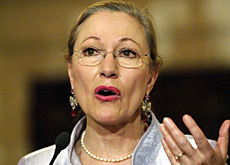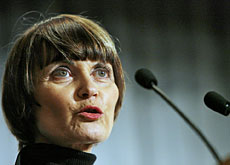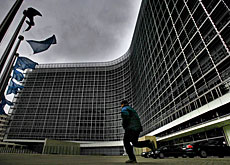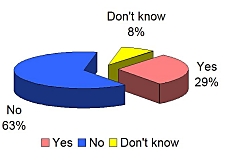EU turns down heat in tax dispute with Swiss

The European Union's external relations commissioner, Benita Ferrero-Waldner, has tried to take the sting out of an ongoing dispute with the Swiss over corporate taxation.
Ferrero-Waldner said that while the EU was still determined to convince the Swiss that low taxes for holding companies offered by some cantons violated a free trade agreement, it was prepared to be patient.
Speaking in Brussels on Monday, the commissioner said it was time to set the record straight. For Ferrero-Waldner, the tax dispute is only due to different interpretations of the 1972 free trade agreement.
She added that it was only one element of a wide-ranging bilateral relationship.
The EU is asking Switzerland to accept its responsibilities in the dispute, having called the low corporate taxes a disguised state subsidy.
Ferrero-Waldner said that sanctions were not on the cards despite earlier threats, but explained that the EU had a legitimate case, especially since Switzerland had privileged access to the European market.
The commissioner declined to say how the two parties could resolve the dispute, only admitting that the solution would have to be “creative.”
She also said that she wanted to give the Swiss more time. “We are always patient with good partners,” added Ferrero-Waldner, who will meet the Swiss authorities early next month.
Demands rejected
Bern has so far rejected Brussels’ demands, first made in February. The Swiss finance ministry has said no contractual regulations exist between Switzerland and the European Union on the harmonisation of company taxation.
It has argued that neither the EU rules on competition, including those on state aid, nor the EU member states’ code of conduct on company taxation are applicable to Switzerland, which is not a member of the union.
Finance Minister Hans-Rudolf Merz met his German counterpart Peer Steinbrück last week to give his position, a position Steinbrück said at the time he could not support. Germany currently holds the rotating EU presidency.
However both sides agreed the issue should not poison the good relationship between the EU and Switzerland.
Earlier this month, Swiss President Micheline Calmy-Rey lashed out, calling the EU demands unacceptable and accusing the union of “poor style”. She said that the European Commission had trodden on a lot of toes with its approach.
Swiss citizens have not appreciated either that the EU is sticking its nose into the country’s business. A recent survey showed that three-quarters of those polled were opposed to any interference from Brussels over the taxation issue.
But at the same time 63 per cent rejected the practice of granting generous tax breaks to holding companies by some cantons.
swissinfo with agencies

More
EU bilateral accords
Selected cantonal corporate tax rates (federal, cantonal and municipal) from a KPMG report published in November 2006: Obwalden 13.1% of operating income, Schwyz 15.6%, Zug 16.4%, Zurich 21.3%, Graubünden 29.1%. Swiss average 21.3%.
Business tax rates in other countries: Japan 40.7%, US 40%, Germany 38.3%, Republic of Ireland 12.5%, Cyprus 10%.
Switzerland is convinced that the procedures for taxing management companies, mixed companies and holding companies in the country do not fall within the scope of the 1972 free trade agreement.
The 1972 accord exclusively governs the trading of certain goods (industrial and agricultural processed products).
Bern says when signing the accord, neither Switzerland nor the European Economic Community intended to harmonise their laws either with regard to goods or in the areas of competition or state subsidies.
It argues that the provisions of the accord are not to be interpreted in the same manner as the EEC treaty’s more detailed rules on competition.

In compliance with the JTI standards
More: SWI swissinfo.ch certified by the Journalism Trust Initiative



You can find an overview of ongoing debates with our journalists here. Please join us!
If you want to start a conversation about a topic raised in this article or want to report factual errors, email us at english@swissinfo.ch.